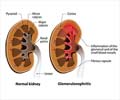Up to 5 percent of prenatal ultrasounds are able to uncover antenatal hydronephrosis, or enlarged kidneys, the most commonly detected prenatal abnormality in the United States.

The research, conducted by clinician-scientists at Nationwide Children's Hospital and collaborating institutions, showed that the effectiveness of preventive or prophylactic antibiotics for children with a prenatal diagnosis of enlarged kidneys depends on the severity of their condition.
For parents like Katie and Drew Danielson, this news comes as a relief. The couple decided to forgo continuous preventive antibiotics for their son's mild case of vesicoureteral reflux (VUR) after consulting a pediatric urologist at Nationwide Children's. VUR is one of the primary causes of enlarged kidneys detected through prenatal ultrasound.
"Having a study like this show that it was the right thing to do is very reaffirming," Katie said. Their son Alexander is now a year old. "We didn't want our son to be on constant antibiotics for a number of reasons, and as it turns out, he wouldn't have needed them anyway. He hasn't had a single UTI."
The Danielsons' experience fits in with the study's results.
"We found that for children with ureteral dilation, severe or high-grade VUR or obstruction of the ureterovesical junction, antibiotics significantly reduced the risk of developing UTIs," said Daniel B. Herz, MD, a urologist at Nationwide Children's and lead author of the recent paper. "In those cases, prophylactic antibiotics are appropriate. But for kids with only mild problems associated with their hydronephrosis, continuous antibiotic therapy is probably not needed."
The researchers compared medical records of over 400 children who were followed for at least 2 years, 278 of whom took continuous antibiotic prophylaxis and 127 of whom did not. They then tallied the number of UTIs in each group and analyzed which conditions resulted in increased UTI risk. The cases were patients from Nationwide Children's and the Children's Hospital at Dartmouth-Hitchcock.
"Our hope is that this study will help guide physicians when they're deciding how to treat a young patient with one of these conditions," Dr. Herz said "We're getting better at identifying which kids are most at risk of UTIs and who can truly benefit from preventive continuous antibiotics. And if we can avoid the hassle and expense of continuous antibiotics for many families without causing them any harm, we should."
Source-Eurekalert
 MEDINDIA
MEDINDIA




 Email
Email










